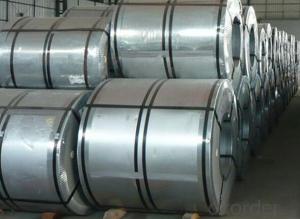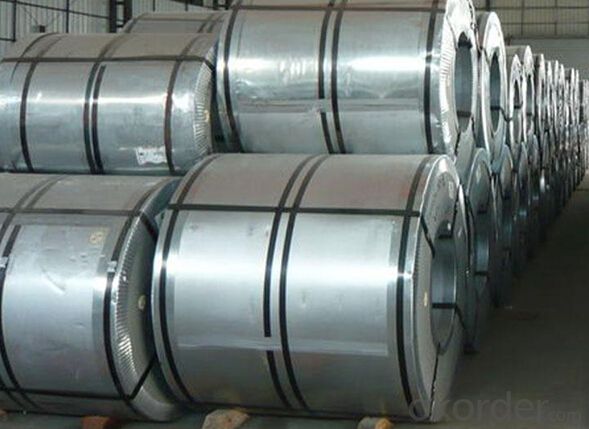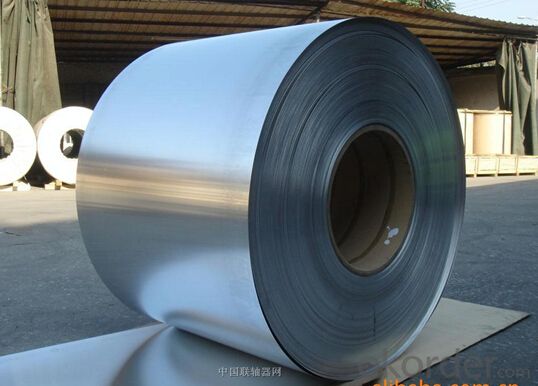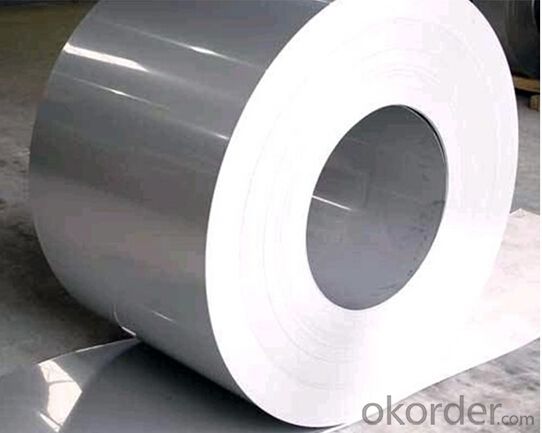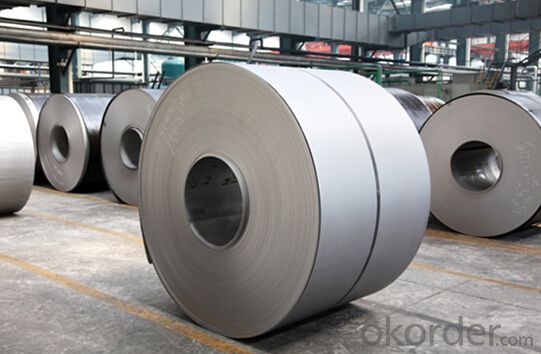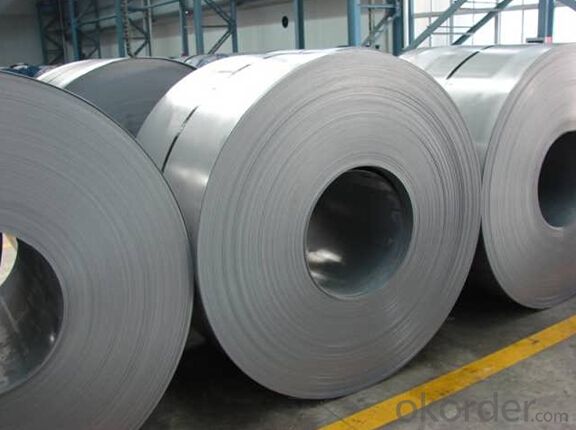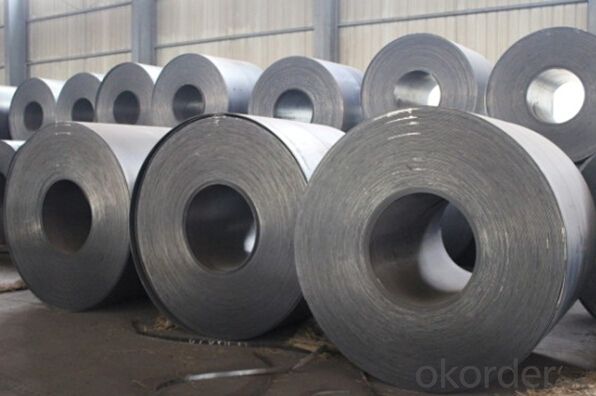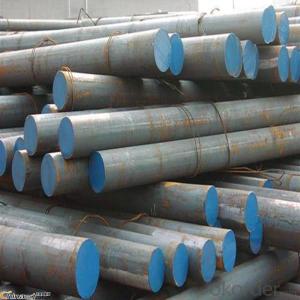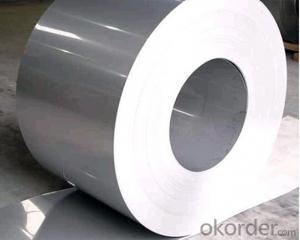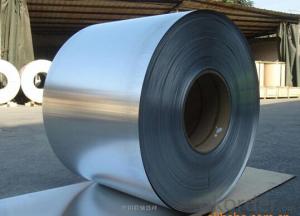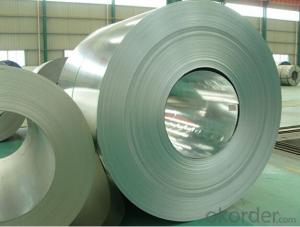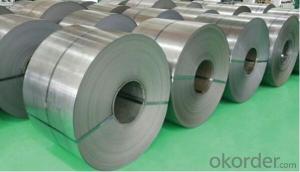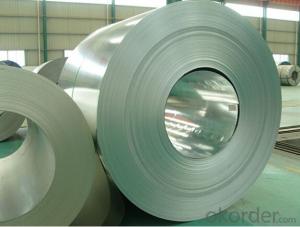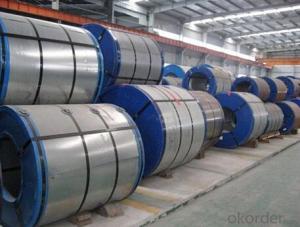Grade JIS G3141-SPCC-SD Galvanized Steel Coil
- Loading Port:
- Tianjin
- Payment Terms:
- TT OR LC
- Min Order Qty:
- 3 m.t.
- Supply Capability:
- 10000 m.t./month
OKorder Service Pledge
OKorder Financial Service
You Might Also Like
Specification
Grade JIS G3141-SPCC-SD Galvanized Steel Coil
Specification of JIS G3141-SPCC-SD Galvanized Steel Coil
1. Galvanized Steel Coil
(1) Width: 600-1570mm
(2) Thickness: 0.13-5.0mm
(3) Grade: JIS G3302-SGCC-SGC570, SGCH (full hard-G550), SGHC-SGH540
EN10346-DX51D+Z, DX53D+Z, S250GD-S550GD
STM A653-CS-B, SS255-SS550
(4) Zinc Coating: Z40g/m2~Z500g/m2 (both side total coating thickness)
2. Galvalume Steel Coil
(1) Width: 600~1500mm
(2) Thickness: 0.15~2.30mm
(3) Grade: JIS G3321-SGLCC, SGLC400-570, (G550)
EN10346-DX51D+AZ, DX53D+AZ, S250-S550
ASTM A792M CS-B, SS255-SS550
(4) AZ Coating: AZ50~AZ185g/m2
3. Prepainted Galvanized Steel Coil (PPGI)
(1) Width: 600~1250mm
(2) Thickness: 0.19~1.50mm
(3) Grade: JIS G3312-CGCC, CGC340-570, (G550)
ASTM A755M CS-B, SS255-SS550
(4) Zinc Coating: Z40g/m2~Z500g/m2 (both side total coating thickness)
4. Prepainted Galvanized Steel Coil (PPGL)
(1) Width: 600~1250mm
(2) Thickness: 0.20~1.50mm
(3) Grade: JIS G3322-CGLCC, CGLC340-570, (G550)
ASTM A755M CS-B, SS255-SS550
(4) AZ Coating: AZ50~AZ185g/m2 (both side total coating thickness)
5. Cold Rolled Steel Coil (Soft) (for further information, pls click the product name)
(1) Width: 600~1570mm
(2) Thickness: 0.13~2.50mm
(3) Grade: JIS G3141-SPCC-SD, SPCD-SD, SPEC-SD
JIS G3135-SPFC 340/390/440
EN10130-DC01, DC03, DC04
SAE1006, SAE1008
ASTM A424-TypeⅡ
6. Cold Rolled Steel Coil (Full Hard) (for further information, pls click the product name)
(1) Width: 600~1570mm
(2) Thickness: 0.13~2.50mm
(3) Grade: JIS G3141-SPCC-1B, SPCC-1D
7. Hot Rolled Steel Coil
(1) Width: 1000~1524mm
(2) Thickness: 1.20~16.5mm, other thickness can be negotiation
(3) Grade: JIS G3101-SS400, JIS G3132-SPHT1/2/3, ASTM A36, Q195, Q235 etc.
Company Introduction of the Grade JIS G3141-SPCC-SD Galvanized Steel Coil
CNBM International Corporation is the most import and export platform of CNBM group(China National Building Material Group Corporation) ,which is a state-owned enterprise, ranked in 270th of Fortune Global 500 in 2015.
With its advantages, CNBM International are mainly concentrate on Cement, Glass, Iron and Steel, Ceramics industries and devotes herself for supplying high quality series of refractories as well as technical consultancies and logistics solution.
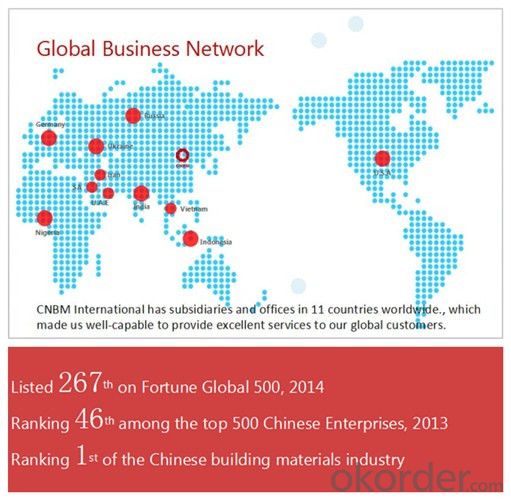
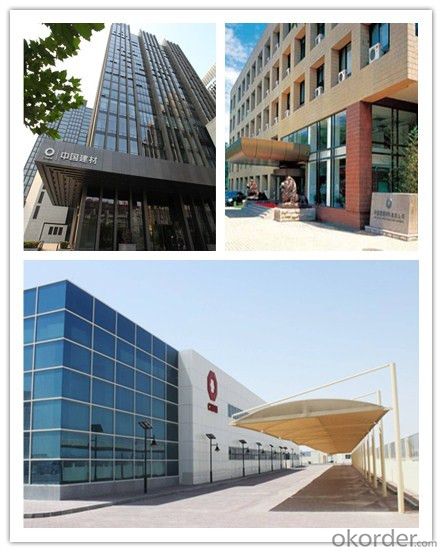
Packaging & Delivery of the Grade JIS G3141-SPCC-SD Galvanized Steel Coil
Packaging Detail | Sea worthy packing /as per customer's packing instruction |
Delivery Detail | 15 ~ 40 days after receiving the deposit |
Products Show:
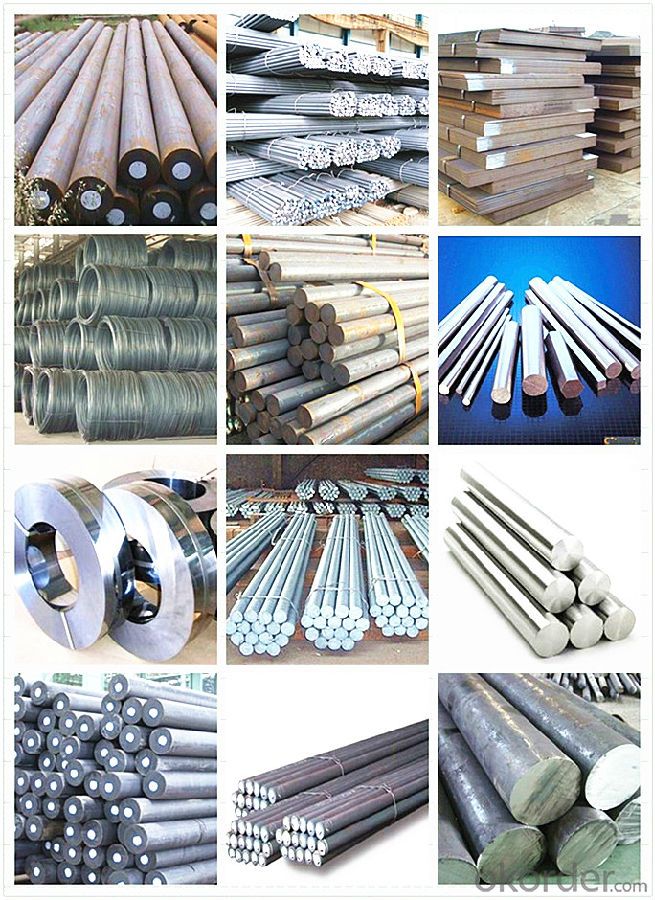
FAQ:
Are you a trading company or manufacturer? | Manufacturer |
What’s the MOQ? | 3 metric ton |
What’s your delivery time? | 15-35 days after downpayment received |
Do you Accept OEM service? | Yes |
what’s your delivery terms? | FOB/CFR/CIF |
What's the Payment Terms? | 30% as deposit,70% before shipment by T/T |
Western Union acceptable for small amount. | |
L/C acceptable for large amount. | |
Scrow ,Paybal,Alipay are also ok | |
Why choose us? | Chose happens because of quality, then price, We can give you both. Additionally, we can also offer professional products inquiry, products knowledge train (for agents), smooth goods delivery, excellent customer solution proposals. |
What's your available port of Shipment? | Main Port, China |
What’s your featured services? | Our service formula: good quality+ good price+ good service=customer's trust
|
Where are your Market? | Covering more than 160 countries in the world |
- Q: How does special steel contribute to the machinery manufacturing industry?
- Special steel plays a crucial role in the machinery manufacturing industry by providing high-quality and durable materials for the production of various machine components. This type of steel is specifically engineered to possess exceptional strength, toughness, and resistance to wear, corrosion, and high temperatures. In the machinery manufacturing industry, special steel is utilized in the production of critical components such as gears, shafts, bearings, and cutting tools. These components are subjected to extreme mechanical forces, exposure to harsh environments, and repetitive motion, requiring a material that can withstand such conditions without compromising performance or safety. The exceptional properties of special steel enable machinery manufacturers to produce equipment that is reliable, efficient, and long-lasting. By utilizing this type of steel, manufacturers can enhance the overall performance and durability of their machinery, ensuring optimal functionality and minimizing the need for frequent repairs or replacements. Moreover, special steel allows for the design and production of more compact and lightweight machinery, leading to improved energy efficiency, reduced manufacturing costs, and increased productivity. The high strength-to-weight ratio of special steel enables the production of smaller and lighter components, without sacrificing durability or performance. Furthermore, the corrosion and heat resistance properties of special steel make it suitable for use in industries with demanding operating conditions, such as aerospace, automotive, and energy. It ensures that machinery can withstand extreme temperatures, chemical exposure, and abrasive environments, enhancing safety and reliability. In conclusion, special steel significantly contributes to the machinery manufacturing industry by providing materials with exceptional strength, toughness, and resistance to wear, corrosion, and high temperatures. Its utilization in critical components ensures the production of reliable, efficient, and durable machinery, leading to improved performance, reduced costs, and increased productivity.
- Q: Can special steel be used in the telecommunications industry?
- Yes, special steel can be used in the telecommunications industry. Special steel, such as stainless steel or high-strength steel, is often used for the construction of telecommunication towers, antennas, and other infrastructure due to its strength, durability, and corrosion resistance. It helps ensure the stability and reliability of telecommunications equipment, particularly in harsh weather conditions or areas prone to corrosion.
- Q: Can special steel be used in the glass manufacturing industry?
- Yes, special steel can be used in the glass manufacturing industry. It is commonly used for the construction of glass melting furnaces, molds, and other equipment that require high heat resistance and mechanical strength.
- Q: What are the specific requirements for special steel used in the marine propeller industry?
- The special steel used in the marine propeller industry must meet specific requirements to ensure optimal performance and durability in harsh marine environments. Some of the key requirements include: 1. Corrosion Resistance: Marine propellers are constantly exposed to saltwater, which can cause corrosion. Therefore, special steel used in the marine propeller industry must have high resistance to corrosion, preventing the formation of rust and maintaining the propeller's integrity over time. 2. Strength and Toughness: Marine propellers are subjected to high mechanical stresses and impacts, especially in rough sea conditions. The special steel used must possess high strength and toughness to withstand these forces without deformation or failure. 3. Fatigue Resistance: Propellers experience cyclic loading due to rotational forces, which can lead to fatigue failure over time. The special steel should have excellent fatigue resistance to withstand millions of load cycles without developing cracks or fractures. 4. Weldability: Propellers are often manufactured in segments and then welded together. The special steel used must be easily weldable, ensuring strong and reliable joints that can withstand the propeller's operational stresses. 5. Heat Resistance: Propellers generate significant heat due to friction and propulsion forces. The special steel should have good heat resistance to prevent deformation or loss of mechanical properties at elevated temperatures. 6. Machinability: Special steel used in the marine propeller industry should be readily machinable to allow for precise shaping and finishing of complex propeller blade designs. 7. Non-Magnetic Properties: Many modern ships utilize magnetic navigation systems and sensors. Therefore, the special steel used in propellers should have low magnetic permeability to minimize interference with these systems. Meeting these specific requirements ensures that the special steel used in the marine propeller industry can withstand the challenging conditions of seawater, provide efficient propulsion, and maintain its structural integrity throughout the propeller's lifespan.
- Q: What are the different types of tool steels used in special steel?
- Some of the different types of tool steels used in special steel include high-speed steels, cold work steels, hot work steels, and plastic mold steels. Each type of tool steel is designed to have specific properties that make it suitable for different applications, such as cutting, shaping, or molding materials.
- Q: How is creep-resistant steel used in the production of power plant components?
- Creep-resistant steel is used in the production of power plant components due to its high resistance to deformation under high temperatures and prolonged exposure to stress. This type of steel is crucial in power plants as it helps maintain the structural integrity of components such as boilers, turbines, and pipes, which are subjected to extreme heat and pressure. By using creep-resistant steel, power plants can ensure the safe and efficient operation of their equipment, reducing the risk of failures and increasing overall reliability.
- Q: What are the main characteristics of magnetic steel forgings?
- The main characteristics of magnetic steel forgings are high strength, excellent wear resistance, and good magnetic properties. These forgings are known for their durability and ability to withstand extreme conditions. They also have good machinability and can be easily formed into various shapes.
- Q: How does the demand for special steel vary across different regions?
- The demand for special steel varies across different regions due to several factors such as industrial development, infrastructure projects, and manufacturing activities. Regions with robust manufacturing sectors and infrastructure development tend to have higher demand for special steel as it is used in various applications like automotive, construction, and machinery. Additionally, regions with a higher focus on technological advancements and innovation may also have a greater demand for special steel due to its unique properties and capabilities. However, regions with limited industrial activities or dependence on specific sectors may exhibit lower demand for special steel. Overall, the demand for special steel is influenced by the specific economic and industrial characteristics of each region.
- Q: How does special steel contribute to the chemical processing aftermarket industry?
- The chemical processing aftermarket industry heavily relies on special steel, which offers a wide range of benefits to enhance the efficiency and performance of equipment. Firstly, special steel is well-known for its exceptional strength and durability, making it ideal for applications involving high pressure, extreme temperatures, and corrosive environments. This durability ensures that the equipment can withstand challenging conditions and operate reliably for extended periods, reducing the need for frequent maintenance and replacement. Furthermore, special steel possesses excellent resistance to corrosion, oxidation, and chemical reactions, which are common challenges in the chemical processing industry. This resistance allows the equipment to handle various chemicals without deteriorating or contaminating the process, ensuring the quality and safety of the end products. Additionally, special steel can withstand the formation of scale, deposits, and other contaminants that can hinder equipment efficiency, reducing the frequency of cleaning and maintenance. Moreover, special steel offers superior mechanical properties such as toughness, hardness, and impact resistance, which are essential for handling heavy loads and abrasive materials. This ensures that the equipment can withstand demanding operational conditions and maintain its performance over time, resulting in enhanced productivity and reduced downtime. Another significant contribution of special steel to the chemical processing aftermarket industry is its versatility. It can be customized and tailored to meet specific requirements, allowing for the manufacturing of complex parts and components essential for various chemical processes. Special steel can be fabricated into different shapes and sizes, enabling the creation of intricate designs and structures that optimize equipment efficiency and effectiveness. In conclusion, special steel is vital to the chemical processing aftermarket industry due to its exceptional strength, durability, resistance to corrosion and chemical reactions, as well as its versatility. By providing reliable and high-performance equipment, special steel significantly contributes to the overall efficiency, safety, and productivity of chemical processing operations.
- Q: What are the main characteristics of high-speed steel forgings?
- Highly desirable in various industries are high-speed steel forgings, which possess several key characteristics. To begin, the exceptional hardness and wear resistance of high-speed steel forgings are noteworthy. This is a result of their composition, which typically includes elements like tungsten, molybdenum, chromium, and vanadium. These elements create hard carbides within the steel matrix, leading to a material capable of enduring high temperatures and resisting abrasion and deformation. Additionally, high-speed steel forgings exhibit excellent heat resistance, enabling them to maintain their hardness and strength even at elevated temperatures. This is particularly significant in applications where tools or components undergo intense heat during operation. Another important trait of high-speed steel forgings is their ability to retain a sharp cutting edge for extended periods. This proves advantageous in cutting tools, where an efficient and precise machining process relies on a sharp edge. The steel's high hardness ensures the cutting edge remains sharp, resulting in enhanced tool life and performance. Moreover, high-speed steel forgings demonstrate good toughness and impact resistance, making them less vulnerable to cracking or chipping under heavy loads or sudden impacts. This ensures their durability and reliability in demanding applications. In addition to these mechanical properties, high-speed steel forgings possess excellent machinability. They can be easily shaped, formed, and machined into intricate geometries, making them ideal for producing complex components or tools. Overall, the main characteristics of high-speed steel forgings encompass exceptional hardness, wear resistance, heat resistance, cutting edge retention, toughness, impact resistance, and machinability. These qualities render them highly sought-after in industries such as aerospace, automotive, tooling, and machining, where performance, reliability, and longevity are of utmost importance.
Send your message to us
Grade JIS G3141-SPCC-SD Galvanized Steel Coil
- Loading Port:
- Tianjin
- Payment Terms:
- TT OR LC
- Min Order Qty:
- 3 m.t.
- Supply Capability:
- 10000 m.t./month
OKorder Service Pledge
OKorder Financial Service
Similar products
Hot products
Hot Searches
Related keywords
